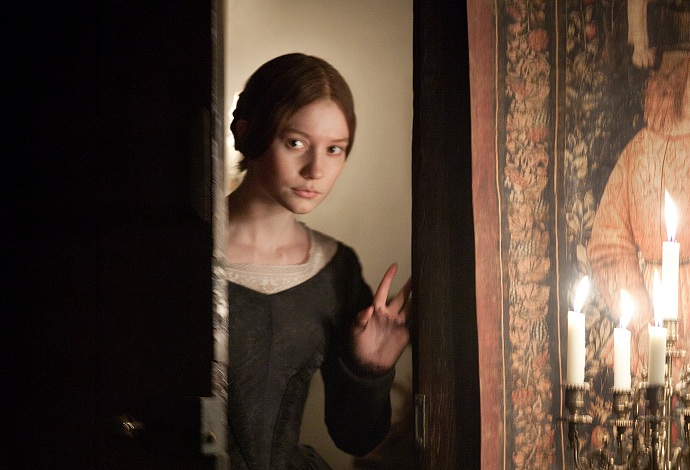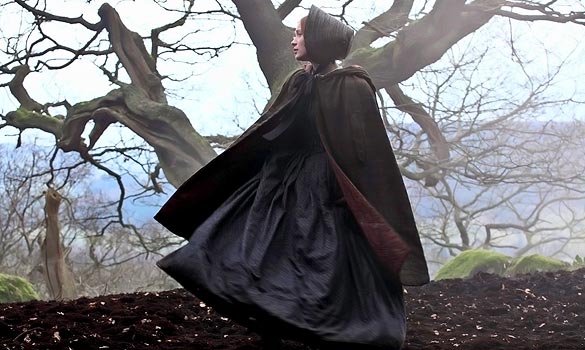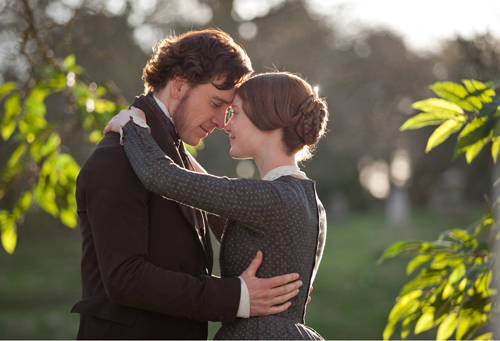Fri 11 Mar 2011
Jane Eyre Approximately
Posted by Ethan under Film Review, NYC Film Critic
[2] Comments
Jane Eyre
Directed by Cary Fukunaga
Written by Moria Buffini
Starring Mia Wasikowska, Michael Fassbender, Jamie Bell, Judi Dench
**1/2
One of my unfortunate cultural blind spots is 19th century British literature penned by female authors. To date, I’ve only read one Jane Austen novel (Pride & Prejudice, which I quite liked by the way), nothing by Mary Shelly (not even Frankenstein, although I did repeatedly devour the Illustrated Classics version back in elementary school) and nothing by any of the three Brontë sisters, Anne, Charlotte and Emily. I’m also embarrassed to admit that I haven’t even seen any of the numerous film versions of the Brontë’s books up to and including the classic 1939 adaptation of Wuthering Heights starring Laurence Olivier and 1943’s Jane Eyre, starring the dynamic duo of Orson Welles and Joan Fontaine. Of course, I am familiar with the broad outlines of both tales—the thwarted love affair between Heathcliff and Cathy and Jane Eyre’s poorly advised infatuation with the brooding Rochester, who keeps his wife locked away in the attic of his gloomy mansion—but couldn’t  offer a blow-by-blow account of specific plot details.
So I went into latest movie to be made from Charlotte Brontë’s 1847 Gothic romance with no obvious reference point in mind, which was both good and bad. Good because it meant that I wouldn’t be constantly comparing this version, which was directed by Cary Fukunaga (Sin Nombre), to the story’s many past iterations. Bad because I couldn’t evaluate how well—or poorly—Fukunaga and screenwriter Moira Buffini were interpreting Brontë’s words. What I can say is that watching this new Jane Eyre reinforced by desire to finally read the book, because I have a hard time believing that the source material is as dry and drab as the movie that unfolded onscreen.
Actually, “drab†isn’t an entirely fair description, because the film does boast beautiful cinematography (lensed by director of photography Adriano Goldman, who also shot Sin Nombre’s striking visuals, which I found to be the most memorable part of that otherwise overrated movie) and a vivid setting (the dark and stormy English moors). Fukunaga opens the movie with a gorgeous sequence that shows the titular heroine (played by Mia Wasikowska) wandering through the empty countryside, a lonely figure lost in an immense wilderness. Flush with a fever, she lands on doorstep of a clergyman St. John Rivers (Jamie Bell) who takes her in and nurses her back to health.
In flashback (a structure that Buffini imposes on the narrative—the novel is told in chronological order) we learn her story; orphaned as a child, Jane lived with her cruel aunt (Sally Hawkins) until being packed away to a boarding school run by equally unpleasant teachers. Despite these hardships, she grew up into a serious-minded and fiercely independent young woman with a skill for teaching. Offered a job as a governess at the remote Thornfield Hall, Jane accepted and oversaw the education of the ward of the manor’s brooding master, Rochester (Michael Fassbender). Against their better judgment, the two developed feelings for each other, feelings that led to a marriage proposal that inevitably exposed Rochester’s dark secret. Upon learning the identity of the mansion’s other resident, the horrified governess ran away and found refuge with good St. John. But try as she might, Jane can’t forget Thornfield or the man she loved there and deep down she knows it’s only a matter of time until she returns.
This all sounds like fodder for a juicy romantic drama and maybe it reads that way on the page. But this particular screen version never generates a lot of heat or intrigue; instead the characters always seem at a distance from each other and from us in the audience. Perhaps mindful of being compared unfavorably to a made-for-TV movie (and there have been a number of television adaptations of Jane Eyre produced over the years, most recently in a well-received 2006 BBC miniseries) Fukunaga keeps the scope of the film as wide as possible, emphasizing the vastness of the moors surrounding Thornfield as well as the long corridors and large rooms that make up the manor. In the process though, he loses the intimacy that would make the relationships resonate a little more deeply. Fassbender and Wasikowska are both skilled, intelligent performers and their intelligence is what registers here rather than their passion for each other. In their hands, Jane and Rochester seem too smart to allow themselves to give in to something as unreliable as their emotions. (Jane’s flirtation with St. John is a non-starter as well and not just due to the fact that Bell looks distinctly out of place here. The characters are so clearly mismatched, there’s no suspense about whether she’ll stay with him or run back to Rochester at the first opportunity.) I came away from this sturdy, handsomely-mounted telling of Jane Eyre feeling as though I had been shown the events of the book, but not the spirit behind them.
Jane Eyre opens in theaters today.
————————————————————————————————————————————————————
Also in Theaters:
Making The Boys
Directed by Crayton Robey
***
Last year’s excellent documentary Stonewall Uprising based its exploration of the origins of the Gay Rights around the transformative Stonewall Inn riots that occurred in New York in the summer of 1969. Crayton Robey’s Making The Boys covers similar ground, albeit through the prism of an artistic, rather than social, act of revolution. One year before Stonewall, frustrated writer and ex-Hollywood bon vivant Mart Crowley, premiered a workshop version of his play The Boys in the Band at a tiny theater in the Village. A claustrophobic portrait of one night in the life of eight gay men (and one that may still be in the closet), Boys was the first show to explicitly give voice to the feelings and concerns of the country’s previously invisible homosexual population. While a modest audience turned out for its debut performance, by the next night crowds were lining up around the block and a new theatrical phenomenon was born, one that inspired numerous touring productions and even a cast album. Two years later, the play was turned into an equally popular film version, directed by William Friedkin and starring all of its original off-Broadway cast. By the time the film arrived in theaters though, Stonewall had happened and Boys became something of a controversial subject within the newly outspoken gay community, with some accusing it reinforcing old stereotypes. These days, the pendulum has mostly swung back and Crowley’s creation is commonly acknowledged as an important, if flawed, first step on the road to greater artistic expression for gay writers and directors. The film version was recently released on DVD for the first time with its own three-part making-of documentary featuring many of the same talking heads (including Crowley, Friedkin and two of the surviving cast members) that appear here. But Making The Boys is a far more expansive affair, with Robey delving into the social climate that inspired Crowley to put pen to paper, the impact—both positive and negative—that Boys’ success had on his career as well as the careers of its cast and the notion that contemporary gay culture has lost touch with its past. Some of the most provocative comments come from the play’s critics, most notably playwright Edward Albee, whose seminal drama Who’s Afraid of Virigina Woolf had an obvious influence on Crowley. Making The Boys lacks some of the dramatic heft of Stonewall Uprising, but it does provide a comprehensive look at the creation and afterlife of a significant work of art.
Elektra Luxx
Written and Directed by Sebastian Gutierrez
Starring Carla Gugino, Joseph Gordon-Levitt, Adrianne Palicki, Timothy Olyphant
**1/2
Who is Sebastian Gutierrez and how has he managed to recruit so many good actors to appear in his half-baked sex comedies? A quick IMDB credit check reveals that Venezuelan-born filmmaker has written the scripts for such classics as Snakes on a Plane and Gothika and helmed the direct-to-DVD vampire movie Rise, starring Lucy Liu and Michael Chiklis. More importantly it notes that he’s the longtime boyfriend of actress Carla Gugino, the star of Gutierrez’s 2009 film Women in Trouble and this unexpected (and, quite frankly, unneeded) follow-up. Both movies follow the misadventures of popular porn actress Elektra Luxx (Gugino) and the other screwball satellite characters that populate her world. Picking up not long after Trouble left off, Elektra Luxx finds its title character having retired from the sex trade as she prepares for the impending birth of her child with rock star Nick Chapel (Josh Brolin), who kicked the bucket at the end of the previous movie. She was still on his mind at the time he died though, as evidenced by the volumes of songs he wrote about her, property that a studly private investigator (Timothy Olyphant) has been tasked with keeping out of her hands. Other new faces in the sequel include Joseph Gordon-Levitt as a blogger who worships Elektra as a goddess among porn stars, Malin Akerman as the quiet girl that pines after him despite his obliviousness to her interest, and Julianne Moore as—believe it or not—the Virgin Mary who appears to Luxx in a vision. Gugino gets to play a new role as well this time around, as we learn that Elektra has a twin sister who up until recently was doing time in pen. (The twin is only seen in flashback here, suggesting that she’ll play a larger role in the next and final entry in this planned trilogy.) Despite not really fitting into the film’s wisp of a narrative, Guitierrez has Adrianne Palicki and Emmanuelle Chriqui reprise their roles as Luxx’s former colleagues in the adult film world and sends them off on a vacation in Mexico where they discover they may have deeper feelings for each other than friendship. Like its predecessor, Elektra Luxx is too ramshackle and sloppy to leave much of a lasting impression. Still, there is pleasure to be derived from watching the talented cast gamely throw themselves into the movie’s broad comic scenarios. (It doesn’t hurt that Gugino, Palicki and Chriqui aren’t shy about showing off their impressive physiques.) I still have no idea how Guitierrez has been able to make two of these utterly disposable movies, but at least the actors seem to appreciate the opportunity to cut loose and be silly.
Certified Copy
Written and Directed by Abbas Kiarostami
Starring Juliette Binoche, William Shimell
****
It isn’t often that I immediately want to watch a film again after the credits roll, but that’s how I felt at the conclusion of Iranian director Abbas Kiarostami’s Certified Copy. This tricky hall-of-mirrors story revolves around a man and a woman (William Shimell and Juliette Binoche) that spend one long day in each other’s company wandering around the Tuscan countryside. He’s a scholar that specializes in reproductions of famous works of art, she’s the owner of a small antiques shop and they have never met before. Over the course of the day though, their relationship undergoes pronounced shifts and, by the end, they have the appearance and attitude of an actual married couple. But are they really husband and wife? Or are they simply a reproduction of the other couples they’ve encountered during their excursion? In the end, the movie isn’t concerned with providing a definitive answer, which is as it should be. The joy of the film emerges from observing the subtle way the nature of their relationship changes over time. Shimell and Binoche—who deservedly won the Best Actress prize at Cannes—deliver marvelous performances that put them (and us) through the emotional wringer. Certified Copy is the kind of movie that demands to be watched again and again because each time you’ll discover something—be it a glance, a bit of body language or a line of dialogue—that transforms it into a new film before your eyes.
Monogamy
Directed by Dana Adam Shapiro
Written by Dana Adam Shapiro and Evan M. Wiener
Starring Chris Messina, Rashida Jones, Meital Dohan
**
This dreary tale of a soon-to-be married couple (Chris Messina and Rashida Jones) experiencing a wicked case of cold feet has exactly one thing going for it: location, location, location. Director Dana Adam Shapiro (making his narrative debut after helming the acclaimed documentary Murderball) shot the movie largely on the streets of Brooklyn and downtown Manhattan and the local scenery gives the audience something to concentrate on when the drama gets turgid. In an obvious nod to Michaelangelo Antonioni’s 1966 classic Blow-Up, Messina’s character is a photographer who becomes obsessed with one of his subjects, a woman who may or may not be cheating on her husband by having sex with a man in various public places around the city. Her apparent infidelity starts to affect his attitude towards his own impending nuptials and leads him to do odd things, from treating his fiancée like shit to putting on a dog mask and barking at himself in a mirror. On the plus side, Messina and Jones share a nice chemistry and the script (by Dana Adam Shapiro, who also directed, and Evan M. Weiner) contains a handful of scenes that effectively capture the sometimes loving and sometimes tense dynamics of a couple that’s been together for a long time. Unfortunately, the main character’s increasingly unpleasant and unbelievable behavior as well as the contrived plot mechanics dilutes the film’s emotional impact.




For me, the best Jane Eyre is the 2006 miniseries with Ruth Wilson and Toby Stephens. It captured the spirit and the passion, and Ruth played the part perfectly. Jane is supposed to be somewhat quiet, intelligent, but most importantly passionate. It seems as if most adaptations portray her as either weak and stupid or just cold.
Thanks for the recommendation-I have heard excellent things about that miniseries. That’ll be the next version I watch after (finally) reading the book. I wouldn’t say that this one portrays her as weak or stupid, but there is a good deal of passion missing.